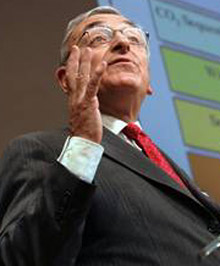 |
 |
 |
 Editorials | Environmental | April 2005 Editorials | Environmental | April 2005  
Nuclear Power 'Regaining Stature' as Option
 Associated Press Associated Press


| Claude Mandil, executive director of the International Energy Agency, delivers a speech Monday during a ministerial international conference in Paris. Nuclear energy is regaining consideration as a key energy source, with concerns over greenhouse gas emissions overcoming worries about accidents at atomic reactors. (Photo: Pierre Verdy/Getty Images)

|
Only by building more nuclear power stations can the world meet its soaring energy needs while averting environmental disaster, experts at an international conference said Monday.

Energy ministers and officials from 74 countries were in Paris for the two-day meeting on the future of nuclear energy, as concerns about global warming and fossil fuel supplies renew governments' interest in atomic power.

"It's clear that nuclear energy is regaining stature as a serious option," said Mohamed ElBaradei, head of the International Atomic Energy Agency - the U.N. nuclear watchdog - which organized the conference.

ElBaradei said the entry into force of the Kyoto Protocol, which commits governments to reduce greenhouse gas emissions, was focusing minds.

Power plants fired by oil, coal and gas are major sources of carbon dioxide and other gases that cause global warming. The Kyoto accord will force plant operators to pay for their pollution, making nuclear power facilities more competitive by comparison.

"In the past, the virtual absence of restrictions or taxes on greenhouse gas emissions has meant that nuclear power's advantage, low emissions, has had no tangible economic value," ElBaradei said. But the Kyoto Protocol "will likely change that over the longer term."

Fossil-Fuel Costs Worrisome

Soaring fossil fuel costs, including the historic highs charted by oil prices during the past year, are a more immediate worry for governments - and a reminder of the petroleum shocks of the 1970s that persuaded countries, including France, to intensify nuclear production.

But accidents at the Three Mile Island facility in Pennsylvania in 1979 and at Chernobyl, Ukraine, seven years later undermined public confidence in nuclear power.

Although there is still deep public concern about the risk of accidents and transportation and storage of radioactive waste, nuclear advocates say there also is a new awareness that relying on fossil fuels could lead to an even greater environmental catastrophe.

"The climate will probably change no matter what we now do, but we should, at the very least, make every effort to slow it down," Donald Johnston, secretary general of the Organization for Economic Cooperation and Development, said in a video statement. "We ignore its importance at our peril."

When Finland begins construction of a new reactor later this year, it will become the first Western European country to do so since 1991. France plans to start building a new-generation reactor in 2007.

Nuclear plants produce one-third of Europe's electricity, saving greenhouse emissions "equivalent to those of all of Europe's cars," French Industry Minister Patrick Devedjian said.

In a message to the conference, U.S. Energy Secretary Sam Bodman cited a University of Chicago study that showed nuclear power "can become competitive with electricity produced by plants fueled by coal or gas" because of new technologies delivering more efficient reactors.

'Time to Start Building Again'

Echoing recent comments by President Bush, Bodman said: "America hasn't ordered a new nuclear power plant since the 1970s, and it's time to start building again."

Even in some countries that have been fiercely opposed to nuclear power, the mood is shifting. For example, Italians voted against the use of atomic energy in a referendum the year after Chernobyl, and the government began gradually decommissioning plants.

"Regarding nuclear power, we perceive a clear change in public opinion, notably by the young generations," Italian Industry Minister Antonio Marzano said.

Asia May Lead the Way

The real boom in nuclear power is expected to focus on developing countries, particularly in Asia.

China is expected to increase its nuclear production capacity from the current 6.5 gigawatts to 36 gigawatts by 2020, according to IAEA figures, while India plans to multiply its production capacity tenfold and Russia is expected to double its capacity to about 45 gigawatts. A gigawatt equals 1 billion watts.

U.S. nuclear plant builder Westinghouse Electric Co. is among contenders for an $8 billion contract for four new Chinese reactors to be awarded by year's end. | 
 | |
 |



